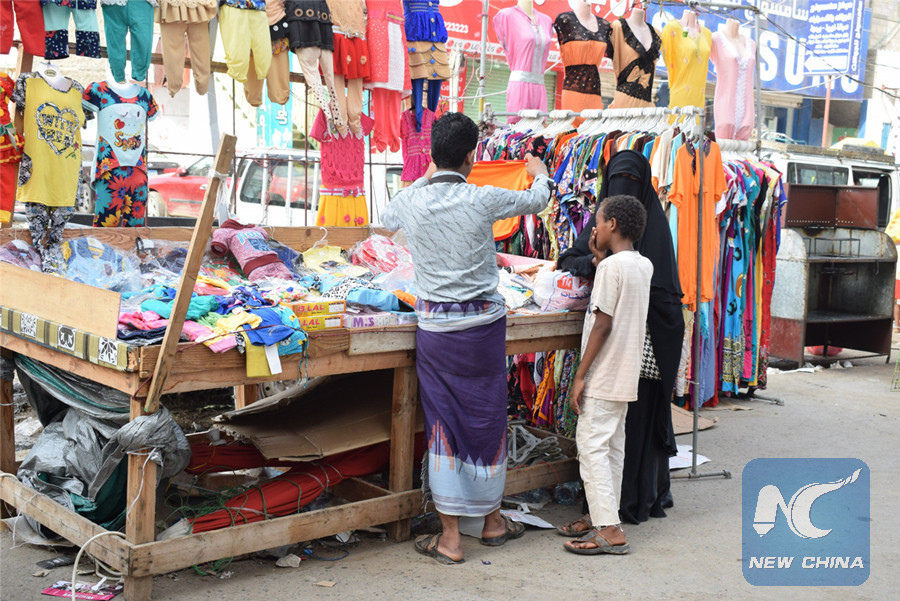
In the war-torn impoverished Arab country Yemen, most people complain bitterly about the skyrocketing prices of goods, particularly clothes. (Xinhua/Murad Abdu)
ADEN, Yemen, June 11 (Xinhua) -- With three days left to Eid al-Fitr, which marks the end of the fasting month of Ramadan, Muslims around the world are busy preparing for the three-day religious festival in joy and happiness.
In Muslim-majority countries, people rush to public markets and shopping malls to buy new Eid clothes and gifts to celebrate this occasion, especially during the last 10 days of Ramadan.
However, things are different in the war-torn impoverished Arab country Yemen, where most people complain bitterly about the skyrocketing prices of goods, particularly clothes.
Um Mothana al-Salahi, a mother of four from the southern port city of Aden, apparently felt exhausted and depressed as she kept moving between different shops in her neighborhood trying to buy Eid clothes for her children.
"I found pants and T-shirts suitable for my kids in some shops, but unfortunately I couldn't afford them," the mother said, adding that the prices of clothes in the government-controlled Aden are much more expensive than she expected.
She said the money in her purse was barely adequate for a pair of pants and a T-shirt for only one child.
"I spent several hours looking for cheap clothes everywhere in the market, but eventually I gave up and got nothing for my kids," Salahi lamented.
Haitham Ali, a newly-recruited soldier, also told Xinhua that he couldn't afford to buy clothes for his two children, given his meager monthly salary.
"I received my 60,000 Yemeni rials (240 U.S. dollars) and my two kids' clothes will cost approximately 49,000 rials. I don't know what to do with this helpless salary," Ali said.
"What about other living expenses and what we would eat and drink if I decide to buy new clothes for my children with almost all my salary?" he added.
Amri Yusif, a government employee, blamed the Saudi-backed Yemeni government for showing no interest in monitoring and controlling such price hike ahead of Eid.
"The clothing price hike this year has reached an unprecedented level. The shopkeepers are freely pricing their commodities as they like," Yusif said.
"For example, a pair of leather sandals manufactured in Turkey cost 19,000 rials in Aden," the government employee noted.
Arwa Saleh, a Yemeni female lawyer, also accused traders of manipulating the prices.
"Traders doubled the prices and took Eid al-Fitr as a golden opportunity to increase their gains fast because they don't fear of any punishment or fines as the country is still in war," she explained.
However, local traders and shopkeepers attributed the price rocket of clothes to the fast depreciation of the Yemeni riyal against foreign currencies, particularly the U.S. dollar.
"High price of clothes is not our fault. Increased fuel prices and difficulties of importing goods from abroad as the country is under blockade, as well as heavy taxes levied by the authorities, are the main reasons behind this crisis," Amjad Hutaibi, a businessman in Aden told Xinhua.
The impoverished Arab country has been locked into a civil war since 2014, when the Iranian-backed Shiite Houthi rebels overran much of the country and seized all northern provinces including the capital Sanaa.
In March 2015, the Saudi-led Arab coalition intervened militarily against Houthis in response to an official request from exiled Yemeni President Abd-Rabbu Mansour Hadi to protect his country.
The military conflict between Iran-backed Houthis and the Saudi-backed Yemeni government recently entered its fourth year, leading to the world's worst humanitarian crisis.
More than 22 million people in Yemen, or three quarters of the population, are in dire need of humanitarian assistance, including 8.4 million who struggle to find their next meal.

